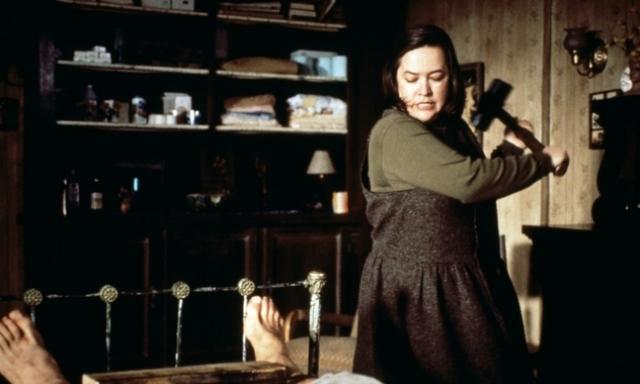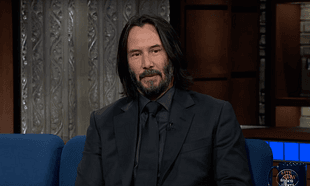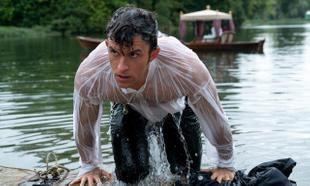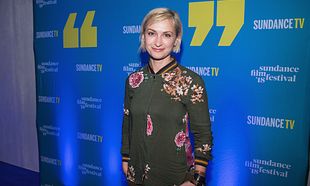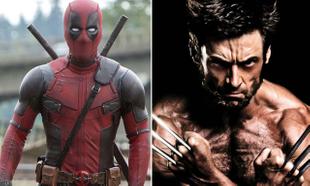With the '90s came a sharp influx of computer effects and more post-modern leanings into the genre of horror.
Although many would say that the '90s was the decade that horror became legitimised, thanks to the likes of Jonathan Demme's 'Silence of the Lambs' and Rob Reiner's 'Misery' receiving awards and critical acclaim, there were still many efforts that were just as pulpy and trashy as anything in the '80s or '70s.
Here's our pick of the ten best horrors of the '90s.
10. 'SCREAM' (1996)
Although subsequent sequels and a poor TV series might have diluted it, 'Scream' is still a film that holds up incredibly well after almost twenty years. Wes Craven, easily one of the most recognisable horror directors of our generation, was on fire and brilliantly subverting the tropes and genre that he himself had helped define. Couple that with a cast of up-and-comers like Neve Campbell, Courtney Cox and Rose MacGowan and a fiendishly clever premise and you've got the defining slasher film of the '90s. The best out of the entire series.
9. 'FUNNY GAMES' (1997)
Easily one of the weirdest horror films on this list, 'Funny Games' is probably Michael Haeneke's most recognisable work - well, this and the shot-for-shot US remake starring Tim Roth and Naomi Watts. Haeneke made 'Funny Games' as a way of sticking a middle finger up at 'heimat' films of his youth. These were films that were idyllic, placid films that were completely cut off from reality and extolled the virtues of nationalist values. 'Lassie Come Home' is probably the closest English-language example of it. The two serial killers, Peter and Paul, look every inch the classically good-looking Austrians and their carefree violence just makes it all the more disturbing.
8. 'AUDITION' (1999)
Takashii Miike, it has to be said, doesn't f*** around. Audition is probably one of, if not, the most grisly and violent films in Asian cinema and without a doubt will leave viewers questioning just what exactly it was all about. A middle-aged man hosts fake auditions for young women so he can screen them and potentially become his wife, with only one woman intriguing him. She, as these things go, is not what she seems and what follows is a bloody, deeply disturbing catalogue of violence and dismemberment. Not for the faint of heart.
7. 'RINGU' (1998)
If 'Audition' was all about violence, Ringu was all about atmosphere. It's a slow-burning, painfully slow horror film about a cursed videotape which is said to house a traditional Japanese ghost that murders anyone who watches it. While some might argue the US remake was better, 'Ringu' has all the unsettling tension and none of the lazy scares of the US remake. Instead, you're left with a deeply troubling story about tradition versus modernity and what happens if you neglect your past.
6. 'EVENT HORIZON' (1997)
Although it's unfairly compared against the rest of horrors set in spaceships, 'Event Horizon' is still a tight little film that plays it remarkably straight. Featuring strong twin performances from Sam Neill and Laurence Fishburne, 'Event Horizon' is remarkably clever at building atmosphere and dread with a pulsing soundtrack and copious amounts of gore and special effects. Highly, highly underrated.
5. 'THE SIXTH SENSE' (1999)
M. Night Shyamalan may be defined by his twists and turns, but none was ever more effective than 'The Sixth Sense'. It's hard to watch it now, considering what we all know about the ending and so on, but upon its release near the end of 1999, it was a phenomenon and made overnight stars out of Haley Joel Osment and M. Night Shyamalan. Has he made a better film since then? He certainly hasn't made a better horror film, that's for sure.
4. 'THE BLAIR WITCH PROJECT' (1999)
Like The Sixth Sense, The Blair Witch Project grew out of a burgeoning Internet and strong word-of-mouth. Alleged to actually be real, 'The Blair Witch Project' was the probably the most talked-about film of the '90s. As the directors correctly pointed out in pre-production for the film, documentaries about horror subjects were often more terrifying than actual horror films - so why not make one? Using the concept of found footage, 'The Blair Witch Project' draws the audience and allows to examine it like a documentary. Much like 'Paranormal Activity', you're looking at every frame to see what's on it and what they're seeing. It's all darkness, of course, but it could be more. That's what makes it so scary.
3. 'MISERY' (1990)
Many people would describe 'Misery' not as a horror, but as a psychological thriller. By our definition, it's a horror. Indeed, Stephen King viewed it as a horror and an exploration of his own feelings of being trapped by success. He wrote the novel 'Misery' after a failed attempt at high fantasy writing, and Rob Reiner took on directing with a similar vein. Reiner was, at that point, known for making light and airy comedies such as 'When Harry Met Sally' or 'This Is Spinal Tap'. With 'Misery', Reiner was channeling his own fears into the film. Kathy Bates rightfully won a Best Actress for her role as Annie Wilkes, creating - after Hannibal Lecter, anyway - the most terrifying villain of the '90s.
2. 'SILENCE OF THE LAMBS' (1991)
In the space of just two years - 1990 and 1991 - horror was now a semi-respected genre in the eyes of the Hollywood establishment. The previous entry had scored a Best Actress Oscar and now, Anthony Hopkins would win a Best Actor for Hannibal Lecter. Paired with Jodie Foster and Jonathan Demme, Hopkins created a frightening portrayal of a monster with no compunction about slicing off someone's face to survive and evade capture. What made Silence of the Lambs more frightening was the sexual politics that were shown. Starling, a bright and talented investigator, is consistently talked down to by superiors by virtue of her gender and is often greeted with comments about her beauty. As well as this, Ted Levine's sheer transformation into Buffalo Bill is just incredible and marked him out as a truly physical actor.
1. 'SE7EN' (1995)
Although David Fincher is often accused of being too cold and clinical with his films, 'Se7en' is a deeply emotional story and the ending is probably one of the most harrowing sequences in the horror genre. As Fincher describes it, it was "a tiny genre picture, the kind that William Friedkin would have made after 'The Exorcist'," and was drawn to how it was less of a "police procedural and more a meditation on evil." That evil was personified by Kevin Spacey, who bravely refused his name to be placed on posters or marquees so as to give audiences a true experience when he's revealed. Slick, deeply disturbing and smartly written, 'Se7en' had it all.
